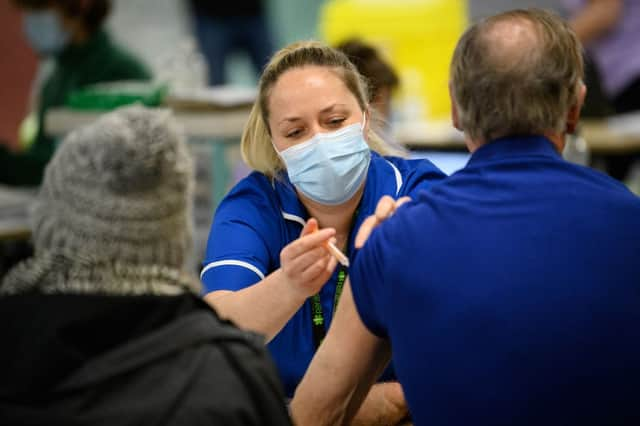This is how long you must wait after your Covid vaccine before seeing friends and family


Vaccines are now being rolled out across the top four priority groups, giving hope of an end to the current coronavirus pandemic.
All three vaccines approved for use in the UK (Oxford/Astra-Zeneca, Pfizer, and Moderna) provide protection against coronavirus - so what will life look like for those who have had the jab?
When does protection kick in for those who are vaccinated?
Advertisement
Hide AdAdvertisement
Hide AdIt is important to remember that, with all three vaccines, two doses are required to reach the maximum efficacy.
Though there is some degree of protection offered after the first dose of the vaccine, it will not have full efficacy without the second dose - which can be a number of weeks after the first.
Doctors recommend, therefore, that those who have had their first dose of the vaccine simply act as though they didn’t - that is to say, continue following the same precautions as before by staying home, keeping a distance from others and practicing good hand hygiene.
Even the first dose of the vaccine will take at least seven days, possibly longer to kick in, meaning even the initial level of immunity isn’t immediate.
Why are two doses required?
Advertisement
Hide AdAdvertisement
Hide AdBooster vaccines are very common in the medical world, with the MMR (measles, mumps and rubella) vaccine booster offered to babies when they are very young.
The first dose of a vaccine activates two types of white blood cell. The first is plasma B cells, which create antibodies to act against the virus. This type of cell is fairly short-lived, however, so without a second shot, rapid decline of these cells will occur, offering weaker protection.
The second type of white blood cell created are T cells, which are tailored to identify a pathogen and kill it. Sometimes, these can linger in the body for decades, providing immunity from diseases can last a lifetime.
Importantly, the booster - or second - dose of the vaccine gives your body a higher frequency of these crucial virus-fighting T cells.
Advertisement
Hide AdAdvertisement
Hide AdCan I mix with family members or friends once they’ve had both doses?
Once someone has received both doses of the vaccine, they will have the full protection offered by the vaccine.
However, there are a couple of reasons why it is not advisable to ditch current guidelines around social distancing and staying at home even when both doses have been received.
The first is that, though offering very high levels of protection, receiving a coronavirus vaccine does not offer 100 per cent protection against the virus; if you expose yourself to others who may have it, there’s still a chance you’ll catch it.
Advertisement
Hide AdAdvertisement
Hide AdIf you have had the vaccination and catch coronavirus, your illness is likely to be far less severe than if you had contracted the virus without it.
Secondly, though scientists expect the vaccination to reduce the risk of people carrying and spreading coronavirus, the evidence is not clear-cut - meaning that, even if you are vaccinated, you might still inadvertently spread the virus to others.
You should continue to follow government measures and guidelines around coronavirus until otherwise instructed.